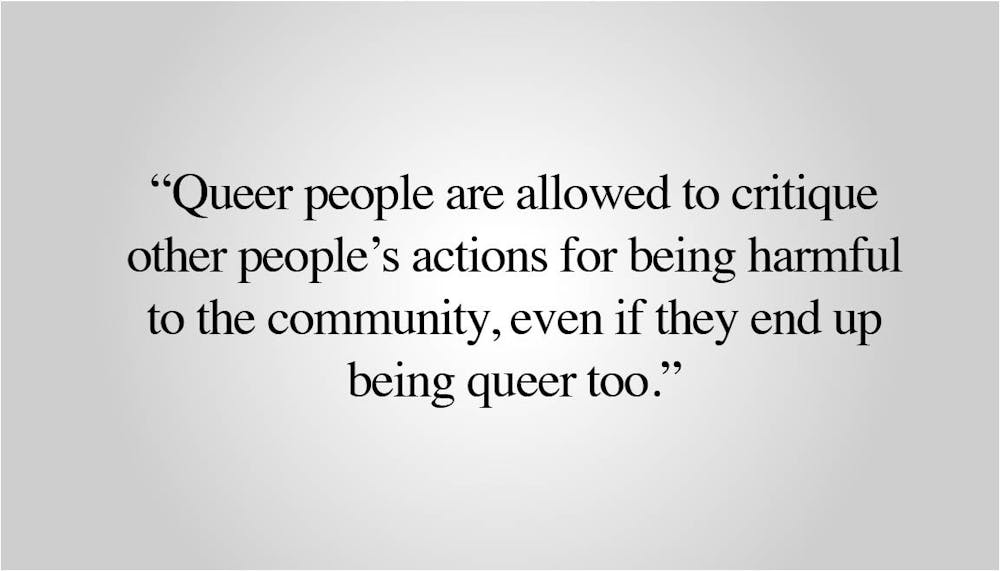The meteoric rise of Harry Styles has been impossible to ignore. Once just another face in the long line of boy-band heartthrobs, Styles has since grown into an artist whose very name is associated with the subversion of male gender stereotypes. He has been lauded as a fashion icon and even a queer icon. And this is where things get a little messy. See, Styles has made it consistently clear that he will not publicly label his sexuality on the grounds that it should bear no relevance to the public’s consumption of his music. But many in the queer community take issue with this ambiguity, and such critiques have more value than many give them credit for.
The term queerbaiting refers to a media trope in which two characters are hinted at being in a queer relationship, only for the relationship to never be confirmed. The main purpose of this trope is to attract a large queer (or queer-supporting) audience invested in a possible gay relationship without simultaneously alienating homophobic audiences (or studio execs) by including explicitly queer characters. In effect, it’s a way to exploitatively cash in on the queer community without actually representing or supporting it in any way.
So how does this relate to Harry Styles? Well, Styles’s usage of queer aesthetics in his public appearances — magazine covers, concerts and red carpets — has been accused of being motivated by the same exploitative intent. Though Styles has seemingly only ever dated women, and normally sings about his love life with women, the combination of his gender-fluid costuming and refusal to identify his sexuality allows fans to conclude that he’s secretly queer. However, his lack of support for the community beyond wearing a skirt or waving a Pride flag means that all but his most homophobic fans can still find him at least tolerable. The result is that Styles remains more popular and palatable than any publicly queer musician can be. With this popularity, Styles has opportunities that could’ve been offered to queer people, like playing a gay man in a film or being the first man in a dress to make Vogue’s cover.
The ability of Styles’ persona to both not explicitly inflame homophobes while drawing queer fans and inspiring endless gay fanfiction has done wonders for him. Meanwhile, he does little for the queer community. As a Business Insider article showed, his LGBTQ+ activism has mainly consisted of him confirming he isn’t explicitly homophobic and one charity sale in 2018. And yet, he is a … queer icon? You can see how it might be frustrating to the actual queer community to watch a man who could very well be straight getting so much of the credit for breaking boundaries and representing the community when actual queer people in media are sidelined. No wonder there’s backlash from queer people against this presumably straight man who has feather-boa-ed his way into iconhood.
And yet, there are many who are mad at not Styles, but his queer critics. They argue that these critics are actually being homophobic toward Styles. This argument has been fueled by recent stories like that of actor Kit Connor of “Heartstopper” fame, who publicly came out as bi in a way he described as “forced” due to pressure from fans who questioned whether he was yet another straight actor playing a gay character. This example has been used by Styles’ defenders to dismiss any criticism of him as pressuring him to come out. But while being pressured to come out is awful, that scenario shouldn’t be used to invalidate nuanced critiques from queer people about the appropriation of their aesthetics.
Take the author of “Simon vs. the Homo Sapiens Agenda,” Becky Albertalli, for example. She also got press attention for being “forced” to come out in 2020 after facing backlash for the queer love story she wrote perpetuating homophobic stereotypes and pandering to straight audiences. Well, those critiques were valid, and they still are even if she came out as queer! Queer liberation is not going to be achieved by validating every person in the community’s experience; it will be achieved by platforming queer issues like the current political threats to trans life in this country, which does not happen when NBC News’ go-to celeb when discussing “gender-fluid fashion” is the apolitical Harry Styles.
No matter his sexuality, Styles owes much of his success to his proximity to straightness. If he really is straight, then his vagueness about his sexuality feels particularly exploitative. If he is queer, it does not change the fact that he has, in many ways, left the community behind. No doors have been opened for our community. No queer singers, actors or artists have been able to rise up in the industry thanks to his impact. In fact, he has more so laid the groundwork for straight celebrities to follow his lead in exploiting the queer community to gain fans and attention. But, perhaps most importantly, even if Styles is actually queer and should be considered a true trailblazer and ally, it still does not make the queer people that feel and argue otherwise wrong for doing so.
So no, you actually don’t need to defend Harry Styles against the queer community. And no, his lack of meaningful action as an ally while appropriating queer aesthetics would not be made better or okay if he suddenly told us all he’s bi. And, yes, maybe, just maybe, queer people are allowed to critique other people’s actions for being harmful to the community, even if they end up being queer too.
Paulie Malherbe ’26 can be reached at paulie_malherbe@brown.edu. Please send responses to this opinion to letters@browndailyherald.com and other op-eds to opinions@browndailyherald.com.





